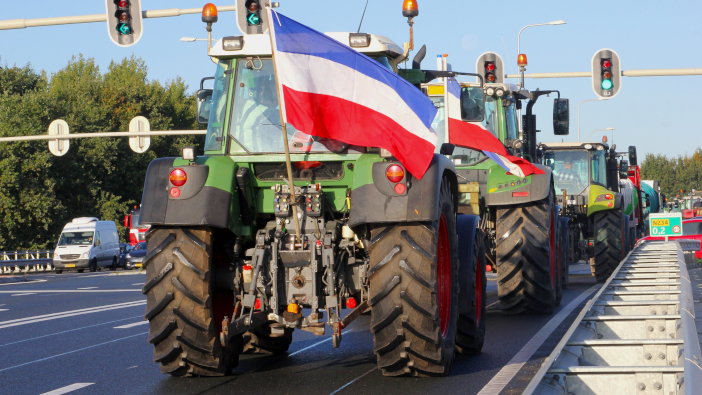Dutch farmers are continuing to protest over the government’s plans to cut emissions, which will see more than half of livestock farmers having to give up or drastically slim down their businesses.
Recently, farmers in the Netherlands have blockaded food distribution centres and major roads with hundreds of tractors, as well as having gathered outside regional assemblies and ministers’ homes, in protest of governmental plans to cut ammonia, nitrogen oxides and nitrous oxide emissions.
The wider Dutch community is also showing its support for the faming sector, by hanging the Dutch flag upside down along roads, bridges and buildings within the Netherlands. While the Polish government and Donald Trump have also stood in support of Dutch farmers.
The latest protests come as authorities announced a radical plan to reduce intensive farming, with a 30 to 50% reduction in livestock numbers across the Netherlands, in a bid to meet environmental targets by 2030.
Rudi Buis, a spokesman for the Dutch agriculture ministry, said to the BBC: “It’s necessary to improve the nature, for our health, for clean air, water, soil and also for the agriculture because we need biodiversity…if we want some economic activity in the future, we also have to improve our nature.”
But the cuts announcement brought with it an onslaught of critique from the farming sector, who say that the plans are an unfair targeting of the Dutch farming sector. Jeroen van Maanen, a Dutch cattle farmer from Zeewolde, said that the news proves that the Netherlands “is not a democracy any more”, but “a dictatorship.”
Jan Brok, vice-chair of BoerBurgerBeweging (The Farmer-Citizen Movement), a rural political party, told the Guardian: “All farmers in the Netherlands do something that releases nitrogen, but there is an unfairness: currently it’s only the farmers who have to reduce emissions, but not the rest of industry.”
“We know exactly what allowance each farmer has and what they produce, while a lot of industrial companies don’t need permission – but they emit nitrogen.”
However, according to Mr Buis, the authorities have ‘no choice’, which is why the farming sector was first addressed in parliamentary briefings; concerns were raised because the Netherlands has the seventh largest livestock population in the EU, but is a relatively small country and so does not have the landmass to make good use of the waste produced on livestock farms.
Natasja Oerlemans, head of the food team at WWF Netherlands, highlighted the lack of waste recycling as one of the major issues in Dutch farming. “This is the only country in the world where manure is regarded as a waste product instead of a valuable source of nutrients and soil health,” she told the Guardian.
Ms Orleans added that the Dutch government has failed to act on scientific data for years now, meaning that drastic measures are now needed to combat the issue. The farming industry’s focus on increasing livestock productivity, she notes, has had a detrimental impact on the ecosystem.
“We export 70% [of the waste], keep all the rubbish, and the gains are all for private companies. It’s a system that’s not sustainable and can’t go on. We [the Netherlands] can be considered as a wake-up call for what happens with very intensive farming systems that don’t take into account the environmental conditions they have to operate in.”




